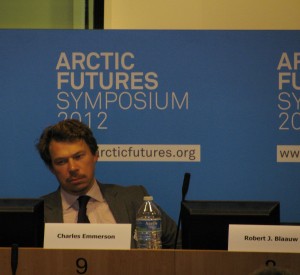Oil from the Arctic: to drill or not to drill…

Charles Emmerson listening to the presentation by Robert J. Blaauw, senior Arctic Adviser with Shell.
Is not such an easy question to answer, Charles Emmerson from the British think-tank Chatham House told the Arctic Futures conference hosted by the International Polar Foundation and the EU committee of the regions in Brussels. In a session on the future of energy resources in the Arctic, he said it depends on various factors, including geographical location, economic costs and geo-political aspects. Emmerson was co-author of a study Arctic Opening: Opportunity and Risk in the High North for Chatham House and Lloyds.
His overall feeling is that the push forward into the Arctic has actually slowed down a little, after various setbacks over the last year. And, he says, there are plenty of good commercial reasons why companies should be wary of Arctic ventures, aside from the environmental concerns.
The situation is Russia is quite different from that of the USA. Emmerson sees a strong imperative to exploit oil in the Russian Arctic, whereas in the USA the economic gains might not match the risks. Cases should be decided on their merit, for which we need a lot more info than we currently have, says Emmerson. At the moment it’s impossible to assess the risks in many Arctic places adequately.

Michel Genet, Executive Director Greenpeace Belgium, questioning Shell’s policy on oil drilling in the Arctic at the Brussels meeting.
Greenpeace would certainly agree with that, and there are some representatives in the audience here at the symposium. They tackled the representative of Shell, who presented the company’s strategy and energy vision up to 2050 at this event. Greenpeace Belgium’s Executive director Michel Genet and Climate campaigner Arnaud Collignon quoted the CEO of Total who recently said oil exploration in the Arctic was too risky.
Water (definitely not oil) off a duck’s back would describe the reaction, I’d say. Shell’s Robert Blaauw begged to differ and noted that Total drills for gas but not oil in Arctic waters.
Expert Emmerson told me he thinks, after the Deep Water Horizon fiasco, companies are really worried about the potential effects on their image if any of the firms had an accident in the Arctic. Seems logical to me. Good to be reminded that we consumers can still have an impact on the multinationals.















